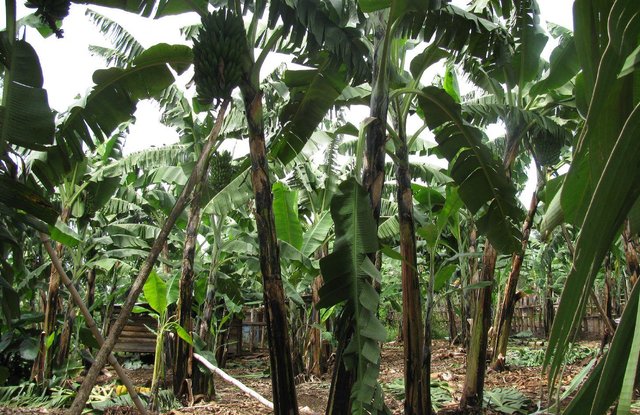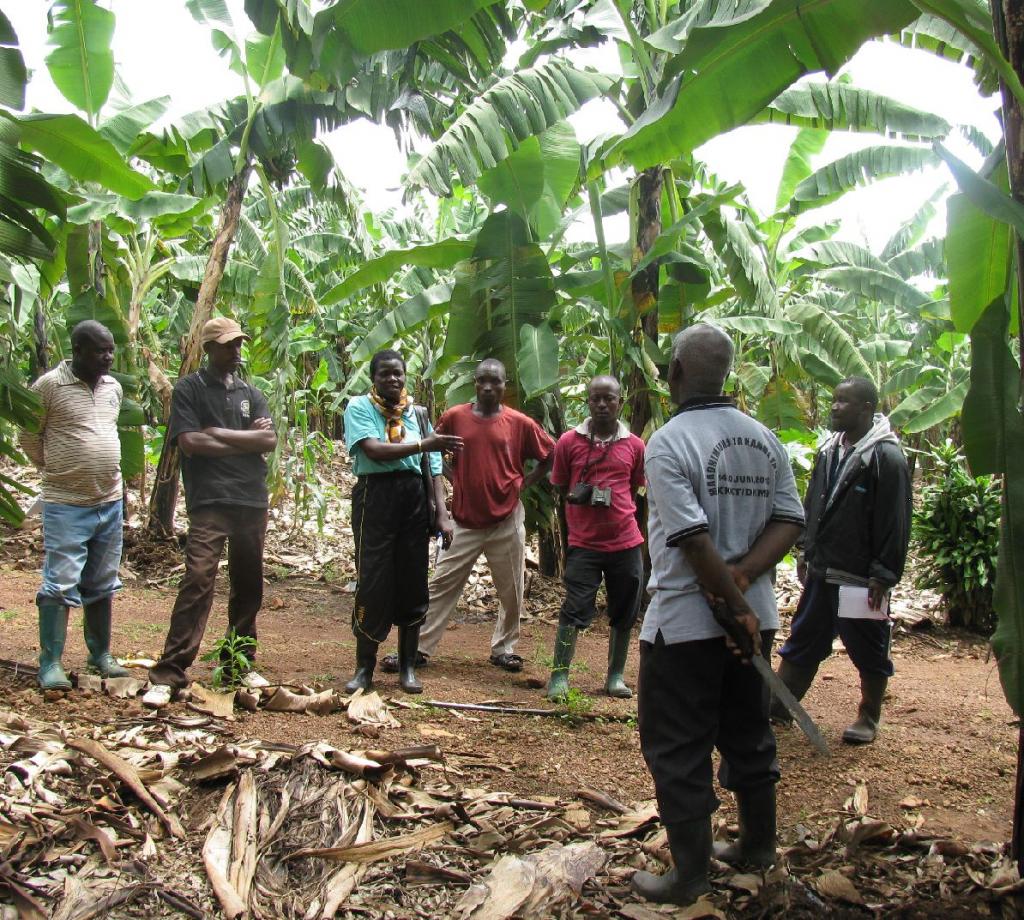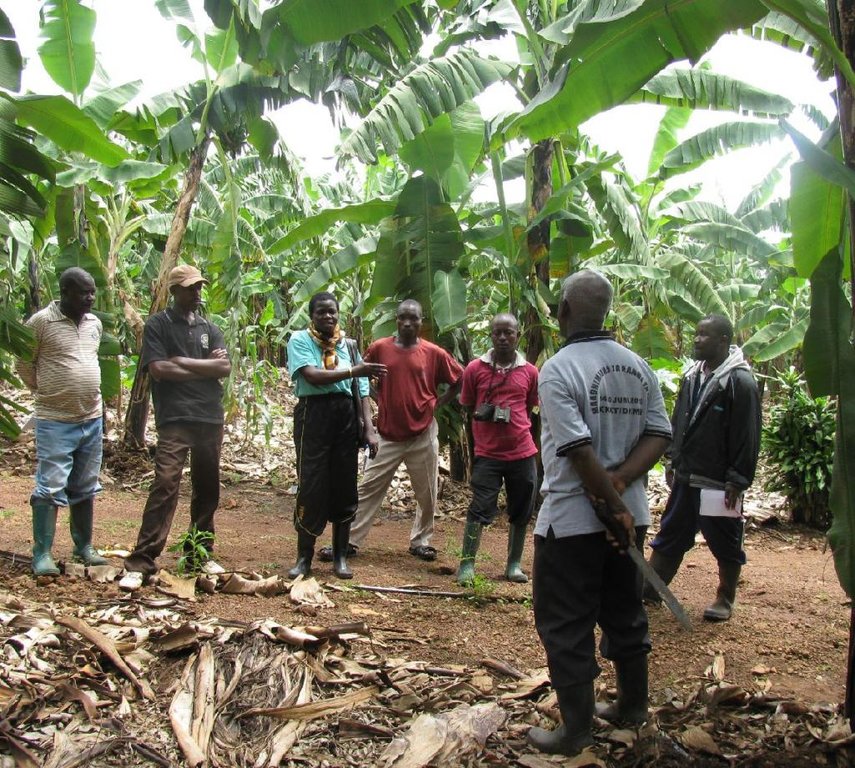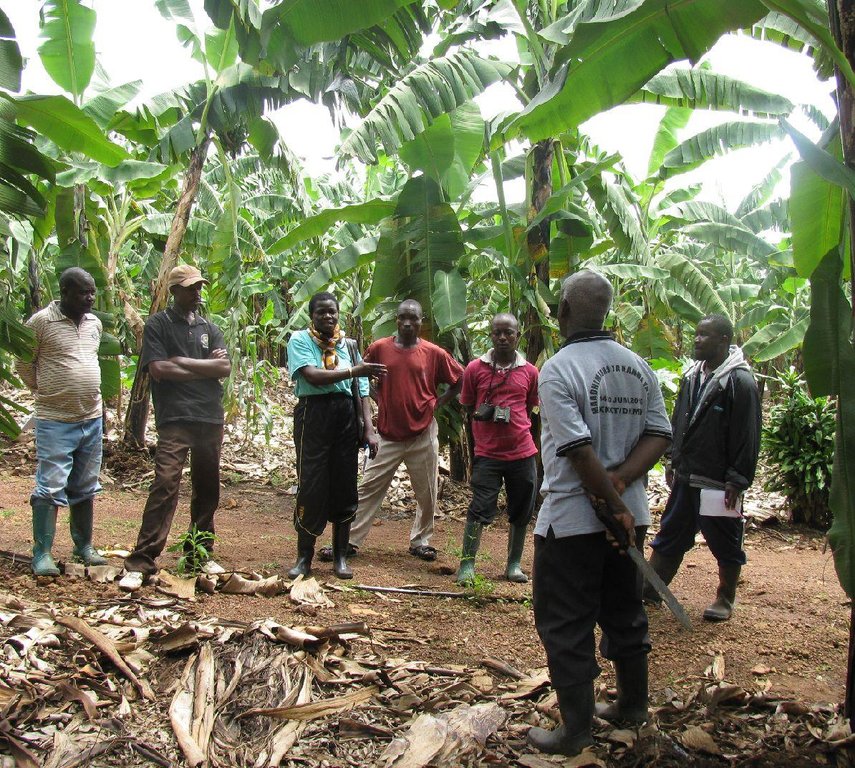Integrated farm knowledge adoption [แทนซาเนีย]
- ผู้สร้างสรรค์:
- การอัพเดท:
- ผู้รวบรวม: Jasson Rwazo
- ผู้เรียบเรียง: –
- ผู้ตรวจสอบ: Fabian Ottiger
Tweyambe
approaches_2677 - แทนซาเนีย
ดูส่วนย่อย
ขยายทั้งหมด ย่อทั้งหมด1. ข้อมูลทั่วไป
1.2 รายละเอียดที่ติดต่อได้ของผู้รวบรวมและองค์กรที่เกี่ยวข้องในการประเมินและการจัดเตรียมทำเอกสารของแนวทาง
1.3 เงื่อนไขที่เกี่ยวข้องกับการใช้ข้อมูลที่ได้บันทึกไว้ผ่านทาง WOCAT
วันที่เก็บรวบรวมข้อมูล (ภาคสนาม):
11/07/2012
ผู้รวบรวมและวิทยากรหลักยอมรับเงื่อนไขเกี่ยวกับการใช้ข้อมูลที่ถูกบันทึกผ่านทาง WOCAT:
ใช่
1.4 การอ้างอิงถึงแบบสอบถามเรื่องเทคโนโลยี SLM

Improved Kibanja cropping system [แทนซาเนีย]
This is a traditional banana and coffee complex cropping system interplanted with annual crops, trees,shrubs, vegetables and other diverse plants of social economic importance.
- ผู้รวบรวม: Jasson Rwazo
2. คำอธิบายของแนวทาง SLM
2.1 การอธิบายแบบสั้น ๆ ของแนวทาง
The way and means through which a performing farmers adopt and use a combination of indigenous and scientific to maximaze production.
2.2 การอธิบายอย่างละเอียดของแนวทาง
การอธิบายอย่างละเอียดของแนวทาง:
Aims / objectives: To adopt and combine indigenous (traditional) and Scientific knowledge in Kibanja system to improve farm productivity through soil and water use efficiency.
Methods: Continuous adoption of indigenous knowledge through story telling and experience
Adoption of technical knowledge extension officers, knowledgeable farmers, projects and research agencies
Implementing the adopted knowledge to the farm
Stages of implementation: Area identification
Area planned phased and rehabilitation and mitigation
Continuous monitoring and supervision to prevent degradation
Introduce small and large stock for manure production
Role of stakeholders: Land user: Promote and use the technology
Community:Maine implementor of the technology,Source of labour
Extension and research:Provision of technical advise
Financial institution for financial capital support
Clan/Family: Family labour
Other important information: Though land ownership is through customary law, but approach is used by both gender, all family members benefit equally from the use of the approach.
Application of this approach needs integrative and proper conceptual understanding of both indigenous and
2.3 รูปภาพของแนวทาง
2.5 ประเทศ ภูมิภาค หรือสถานที่ตั้งที่ได้นำแนวทางไปใช้
ประเทศ:
แทนซาเนีย
ภูมิภาค/รัฐ/จังหวัด: :
Kagera
ข้อมูลเฉพาะเพิ่มเติมของสถานที่ตั้ง:
Missenyi
2.7 ประเภทของแนวทาง
- Integrated knowledge adoption(traditional,innovative,project)
2.8 เป้าหมายหรือวัตถุประสงค์หลักของแนวทาง
The Approach focused mainly on SLM with other activities (Improvement of house hold food security and income)
To improve agricultural production and productivity
Sustainable utilization of land and water
To minimize loss during adverse condition (drought/Wind)
To improve house hold food security,income and livelihood
The SLM Approach addressed the following problems: Low agricultural production
Inadequate complementary use of indigenous and technical knowledge
Poor livelihood and income
2.9 เงื่อนไขที่เอื้ออำนวยหรือเป็นอุปสรรคต่อการนำเทคโนโลยีภายใต้แนวทางนี้ไปปฏิบัติใช้
การมีไว้ให้หรือการเข้าถึงแหล่งการเงินและบริการ
- เป็นอุปสรรค
Inadequate financial capital
Treatment through the SLM Approach: Phase/Stepwise rehabilitation and expansion
Introducing saving and credit scheme through village bank
ความรู้เกี่ยวกับ SLM การเข้าถึงการสนับสนุนด้านเทคนิค
- เป็นอุปสรรค
Lack of proper integration of indigenous scientific knowledge
Treatment through the SLM Approach: Research
ปริมาณงานที่ทำได้ กำลังคนที่มีให้
- เป็นอุปสรรค
Lab our intensive
Treatment through the SLM Approach: To modernize the technology to allow mechanisation
3. การมีส่วนร่วมและบทบาทของผู้มีส่วนได้ส่วนเสียที่เกี่ยวข้อง
3.1 ผู้มีส่วนได้ส่วนเสียที่เกี่ยวข้องในแนวทางนี้และบทบาท
- ผู้ใช้ที่ดินระดับท้องถิ่นหรือชุมชนระดับท้องถิ่น
Land user and casual labour
Approach requires capita
- นักวิจัย
Research institute
ถ้ามีผู้มีส่วนได้ส่วนเสียหลายคนที่เกี่ยวข้องให้ระบุหน่วยงานตัวแทน:
Elders developed the approach through trial and error
3.2 การเกี่ยวข้องของผู้ใช้ที่ดินระดับท้องถิ่นหรือชุมชนระดับท้องถิ่นในช่วงต่างๆของแนวทาง
| ความเกี่ยวข้องของผู้ใช้ที่ดินระดับท้องถิ่นหรือชุมชนระดับท้องถิ่น | ระบุผู้ที่มีส่วนเกี่ยวข้องและอธิบายกิจกรรม | |
|---|---|---|
| การริเริ่มหรือการจูงใจ | ระดมกำลังด้วยตนเอง | Land user and his family |
| การวางแผน | ระดมกำลังด้วยตนเอง | Land user and his family |
| การดำเนินการ | ระดมกำลังด้วยตนเอง | Land user and his family |
| การติดตามตรวจสอบหรือการประเมินผล | ระดมกำลังด้วยตนเอง | Land user and his family |
| Research | ระดมกำลังด้วยตนเอง | Land user and his family |
3.4 การตัดสินใจเลือกใช้เทคโนโลยี SLM
ระบุผู้ที่ทำการตัดสินใจเลือกเทคโนโลยีมากกว่าหนึ่งวิธีไปปฏิบัติใช้:
- ผู้ใช้ที่ดินเพียงผู้เดียว ( ริเริ่มด้วยตัวเอง)
การอธิบาย:
The land user through his own initiative basing on experience and interaction with other land user and experts decide on the proper technology to use
Decisions on the method of implementing the SLM Technology were made by by land users* alone (self-initiative / bottom-up). The land user through his own initiative basing on experience and interaction with other land user and experts decide on the proper technology to implementation of the technology
5. การสนับสนุนด้านการเงินและวัสดุอุปกรณ์
5.1 ระบุงบประมาณประจำปีสำหรับแนวทาง SLM นี้
ถ้าหากว่างบประมาณประจำปีไม่เป็นที่ทราบแน่นอน ให้ระบุช่วงลงไป:
- 2,000-10,000
แสดงความคิดเห็น (แหล่งของการระดมทุน ผู้บริจาคคนสำคัญ):
Approach costs were met by the following donors: local community / land user(s) (Land user on his own): 100.0%
6. การวิเคราะห์ผลกระทบและการสรุป
6.1 ผลกระทบของแนวทาง
ช่วยให้ผู้ใช้ที่ดินนำเอาเทคโนโลยี SLMไปใช้และบำรุงรักษาสภาพไว้ได้หรือไม่:
- ไม่ใช่
- ใช่ เล็กน้อย
- ใช่ ปานกลาง
- ใช่ อย่างมาก
Increase of the size of banana bunch, control of erosion and soil nutrient loss
ทำให้กลุ่มด้อยโอกาสมีอำนาจทางสังคมและเศรษฐกิจหรือไม่:
- ไม่ใช่
- ใช่ เล็กน้อย
- ใช่ ปานกลาง
- ใช่ อย่างมาก
Did other land users / projects adopt the Approach?
- ไม่ใช่
- ใช่ เล็กน้อย
- ใช่ ปานกลาง
- ใช่ อย่างมาก
Did the Approach lead to improved livelihoods / human well-being?
- ไม่ใช่
- ใช่ เล็กน้อย
- ใช่ ปานกลาง
- ใช่ อย่างมาก
Did the Approach help to alleviate poverty?
- ไม่ใช่
- ใช่ เล็กน้อย
- ใช่ ปานกลาง
- ใช่ อย่างมาก
7. การอ้างอิงและการเชื่อมต่อ
7.1 วิธีการหรือแหล่งข้อมูล
- ไปเยี่ยมชมภาคสนาม การสำรวจพื้นที่ภาคสนาม
- การสัมภาษณ์กับผู้ใช้ที่ดิน
ลิงก์และโมดูล
ขยายทั้งหมด ย่อทั้งหมดลิงก์

Improved Kibanja cropping system [แทนซาเนีย]
This is a traditional banana and coffee complex cropping system interplanted with annual crops, trees,shrubs, vegetables and other diverse plants of social economic importance.
- ผู้รวบรวม: Jasson Rwazo
โมดูล
ไม่มีโมดูล




